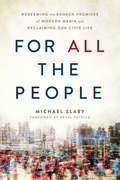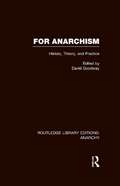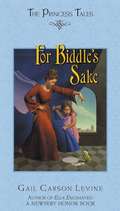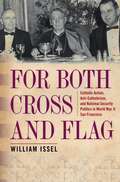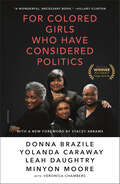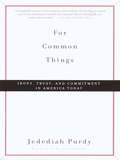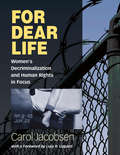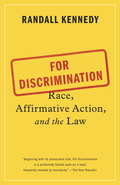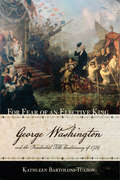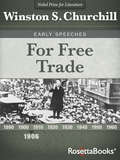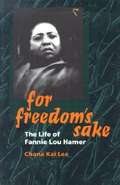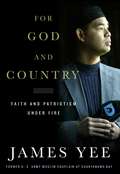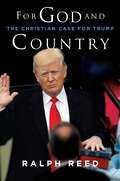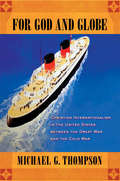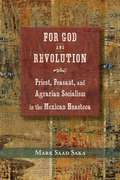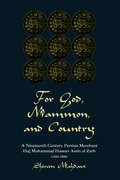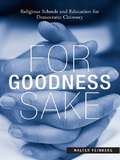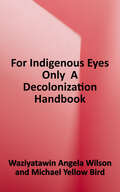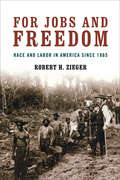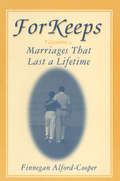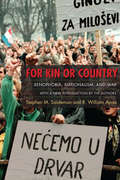- Table View
- List View
For ALL the People: Redeeming the Broken Promises of Modern Media and Reclaiming Our Civic Life
by Michael SlabyA leader in digital communication and grassroots political campaigns explains how the internet and modern media have undermined America and how we can reclaim our voices for the good of civic life.The creators of the internet promised us jetpacks: better experiences, more choices, and deeper relationships.Built on a diversity of voices, our online freedom was supposed to spark a democratic transformation. But our platforms don't work for us—we're the inventory and our outrage fuels a tech revolution optimized for profit, not civic life.As one of the top digital strategists for Barack Obama's two presidential campaigns, Michael Slaby saw the beginning of a new kind of national division. What he witnessed would spawn the Tea Party movement, upset the 2016 election, and accelerate the polarization of American civic life.Slaby presents the four core areas which can be reclaimed to work better for all of us: platforms, government institutions, corporations, and even the users ourselves. Optimistic, future-focused, and deeply passionate, For ALL the People breaks down how we got here, and how we, the users, can work toward a better democracy through tech.
For Anarchism: History Theory And Practice (Routledge Library Editions: Anarchy)
by David GoodwayThis collection discusses both the history and theory of anarchism and in particular examines italian anarchism, the relationship between Marxism and anarchism, the influence of Kropotkin, new social movements and the anarchist theory of history.
For Biddle's Sake (The Princess Tales)
by Gail Carson LevineIn this humorous retelling of Andrew Lang's "Puddocky," a young maiden who has been transformed into a toad by a jealous fairy relies on her newly honed magical abilities to charm a prince into marriage.
For Both Cross and Flag: Catholic Action, Anti-Catholicism, and National Security Politics in World War II San Francisco
by William IsselIn this fascinating, detailed history, William Issel recounts the civil right abuses suffered by Sylvester Andriano, an Italian American Catholic civil leader whose religious and political activism in San Francisco provoked an Anti-Catholic campaign against him. A leading figure in the Catholic Action movement, Andriano was falsely accused in state and federal Un-American Activities Committee hearings of having Fascist sympathies prior to and during World War II. As his ordeal began, Andriano was subjected to a hostile investigation by the FBI, whose confidential informants were his political rivals. Furthermore, the U. S. Army ordered him to be relocated on the grounds that he was a security risk. For Both Cross and Flagprovides a dramatic illustration of what can happen when parties to urban political rivalries, rooted in religious and ideological differences, seize the opportunity provided by a wartime national security emergency to demonize their enemy as 'a potentially dangerous person. ' Issel presents a cast of characters that includes archbishops, radicals, the Kremlin, J. Edgar Hoover, and more to examine the significant role faith-based political activism played in the political culture that violated Andriano's constitutional rights. Exploring the ramifications of this story,For Both Cross and Flagpresents interesting implications for contemporary events and issues relating to urban politics, ethnic groups, and religion in a time of war.
For Brown Girls with Sharp Edges and Tender Hearts: A Love Letter to Women of Color
by Prisca Dorcas Mojica RodriguezThe founder of Latina Rebels and a &“Latinx Activist You Should Know&”(Teen Vogue) arms women of color with the tools and knowledge they need to find success on their own terms For generations, Brown girls have had to push against powerful forces of sexism, racism, and classism, often feeling alone in the struggle. By founding Latina Rebels, Prisca Dorcas Mojica Rodríguez has created a community to help women fight together. In For Brown Girls with Sharp Edges and Tender Hearts, she offers wisdom and a liberating path forward for all women of color. She crafts powerful ways to address the challenges Brown girls face, from imposter syndrome to colorism. She empowers women to decolonize their worldview, and defy &“universal&” white narratives, by telling their own stories. Her book guides women of color toward a sense of pride and sisterhood and offers essential tools to energize a movement.May it spark a fire within you.
For Colored Girls Who Have Considered Politics
by Donna Brazile Yolanda Caraway Leah Daughtry Minyon Moore“For Colored Girls Who Have Considered Politics. It’s a wonderful, necessary book.”– Hillary ClintonThe four most powerful African American women in politics share the story of their friendship and how it has changed politics in America.The lives of black women in American politics are remarkably absent from the shelves of bookstores and libraries. For Colored Girls Who Have Considered Politics is a sweeping view of American history from the vantage points of four women who have lived and worked behind the scenes in politics for over thirty years—Donna Brazile, Yolanda Caraway, Leah Daughtry, and Minyon Moore—a group of women who call themselves The Colored Girls. Like many people who have spent their careers in public service, they view their lives in four-year waves where presidential campaigns and elections have been common threads. For most of the Colored Girls, their story starts with Jesse Jackson’s first campaign for president. From there, they went on to work on the presidential campaigns of Walter Mondale, Michael Dukakis, Bill Clinton, Al Gore, Barack Obama and Hillary Rodham Clinton. Over the years, they’ve filled many roles: in the corporate world, on campaigns, in unions, in churches, in their own businesses and in the White House. Through all of this, they’ve worked with those who have shaped our country’s history—US Presidents such as Bill Clinton and Barack Obama, well-known political figures such as Terry McAuliffe and Howard Dean, and legendary activists and historical figures such as Jesse Jackson, Coretta Scott King, and Betty Shabazz.For Colored Girls Who Have Considered Politics is filled with personal stories that bring to life heroic figures we all know and introduce us to some of those who’ve worked behind the scenes but are still hidden. Whatever their perch, the Colored Girls are always focused on the larger goal of “hurrying history” so that every American — regardless of race, gender or religious background — can have a seat at the table. This is their story.
For Common Things: Irony, Trust, and Commitment in America Today
by Jedediah PurdyJedediah Purdy calls For Common Things his "letter of love for the world's possibilities." Indeed, these pages--which have already garnered a flurry of attention among readers and in the media--constitute a passionate and persuasive testament to the value of political, social, and community reengagement. Drawing on a wide range of literary and cultural influences--from the writings of Montaigne and Thoreau to the recent popularity of empty entertainment and breathless chroniclers of the technological age--Purdy raises potent questions about our stewardship of civic values.Most important, Purdy offers us an engaging, honest, and bracing reminder of what is crucial to the healing and betterment of society, and impels us to consider all that we hold in common.From the Trade Paperback edition.
For Crying Out Loud: The World According to Clarkson Volume 3 (The World According to Clarkson)
by Jeremy ClarksonJeremy Clarkson, shares his opinions on just about everything in For Crying Out Loud.The publication of The World According to Clarkson in 2004 launched a multi-million copy bestselling phenomenon. But to no avail. Jeremy's one man war on crimes against common sense has not yet been won. And out hero's still scratching his head at the madness of it all. But it's not all bad. He's learnt a little along the way, including:• Why binge drinking is good for you• The worst word in the English language• The remarkable secret of eternal youth• The problem with America• And how to dispose of a seal For anyone who's been driven to wonder just what is the matter with people these days, For Crying Out Loud is the perfect riposte. Surprising, fearless and always laugh-out-loud funny, Clarkson's back. And he's got a point . . .For Crying Out Loud is a hilarious collection of Jeremy's Sunday Times columns and the third in his The World According to Clarkson series which also includes The World According to Clarkson, And Another Thing... and How Hard Can It Be?Praise for Jeremy Clarkson:'Brilliant . . . laugh-out-loud' Daily Telegraph'Outrageously funny . . . will have you in stitches' Time Out'Cars take a back seat as Clarkson grumpily lets rip . . . the man has a point!' ZooNumber-one bestseller Jeremy Clarkson writes on cars, current affairs and anything else that annoys him in his sharp and funny collections. Born To Be Riled, Clarkson On Cars, Don't Stop Me Now, Driven To Distraction, Round the Bend, Motorworld and I Know You Got Soul are also available as Penguin paperbacks; the Penguin App iClarkson: The Book of Cars can be downloaded on the App Store.Jeremy Clarkson because his writing career on the Rotherham Advertiser. Since then he has written for the Sun and the Sunday Times. Today he is the tallest person working in British television, and is the presenter of the hugely popular Top Gear.
For Dear Life: Women's Decriminalization and Human Rights in Focus
by Carol JacobsenFor Dear Life chronicles feminist and artist Carol Jacobsen's deep commitment to the causes of justice and human rights, and focuses a critical lens on an American criminal-legal regime that imparts racist, gendered, and classist modes of punishment to women lawbreakers. Jacobsen's tireless work with and for women prisoners is charted in this rich assemblage of images and texts that reveal the collective strategies she and the prisoners have employed to receive justice. The book gives evidence that women's lawbreaking is often an effort to survive gender-based violence. The faces, letters, and testimonies of dozens of incarcerated women with whom Jacobsen has worked present a visceral yet politicized chorus of voices against the criminal-legal systems that fail us all. Their voices are joined by those of leading feminist scholars in essays that illuminate the arduous methods of dissent that Jacobsen and the others have employed to win freedom for more than a dozen women sentenced to life imprisonment, and to free many more from torturous prison conditions. The book is a document to Jacobsen's love and lifelong commitment to creating feminist justice and freedom, and to the efficacy of her artistic, legal, and extralegal political actions on behalf of women.
For Discrimination
by Randall KennedyIn the wake of the Supreme Court's recent decision regarding Fisher v. University of Texas, For Discrimination is at once the definitive reckoning with one of America's most explosively contentious and divisive issues and a principled work of advocacy for clearly defined justice. What precisely is affirmative action, and why is it fiercely championed by some and just as fiercely denounced by others? Does it signify a boon or a stigma? Or is it simply reverse discrimination? What are its benefits and costs to American society? What are the exact indicia determining who should or should not be accorded affirmative action? When should affirmative action end, if it must? Randall Kennedy, Harvard Law School professor and author of such critically acclaimed and provocative books as Race, Crime, and the Law and the national best-seller Nigger: The Strange Career of a Troublesome Word, gives us a concise, gimlet-eyed, and deeply personal conspectus of the policy, refusing to shy away from the myriad complexities of an issue that continues to bedevil American race relations. With pellucid reasoning, Kennedy accounts for the slipperiness of the term "affirmative action" as it has been appropriated by ideologues of every stripe; delves into the complex and surprising legal history of the policy; coolly analyzes key arguments pro and con advanced by the left and right, including the so-called color-blind, race-neutral challenge; critiques the impact of Supreme Court decisions on higher education; and ponders the future of affirmative action.
For Fear of an Elective King: George Washington and the Presidential Title Controversy of 1789
by Kathleen Bartoloni-TuazonIn the spring of 1789, within weeks of the establishment of the new federal government based on the U.S. Constitution, the Senate and House of Representatives fell into dispute regarding how to address the president. Congress, the press, and individuals debated more than a dozen titles, many of which had royal associations and some of which were clearly monarchical. For Fear of an Elective King is Kathleen Bartoloni-Tuazon's rich account of the title controversy and its meanings. The short, intense legislative phase and the prolonged, equally intense public phase animated and shaped the new nation’s broadening political community. Rather than simply reflecting an obsession with etiquette, the question challenged Americans to find an acceptable balance between power and the people’s sovereignty while assuring the country’s place in the Atlantic world. Bartoloni-Tuazon argues that the resolution of the controversy in favor of the modest title of "President" established the importance of recognition of the people's views by the president and evidence of modesty in the presidency, an approach to leadership that fledged the presidency’s power by not flaunting it. How the country titled the president reflected the views of everyday people, as well as the recognition by social and political elites of the irony that authority rested with acquiescence to egalitarian principles. The controversy’s outcome affirmed the republican character of the country’s new president and government, even as the conflict was the opening volley in increasingly partisan struggles over executive power. As such, the dispute is as relevant today as in 1789.
For Free Trade (Winston S. Churchill Early Speeches)
by Winston S. ChurchillThis collection of speeches in support of free trade by the future Prime Minister tracks his early rise in British Parliament. Throughout his career—as both a Conservative and a Liberal—Winston Churchill was a strong supporter of free trade. As a Conservative, this position was sometimes controversial; early in his career, Churchill opposed Joseph Chamberlain's strategy of imposing tariffs to protect Britain&’s economic dominance. When he defected to the Liberal Party in 1904, Churchill continued to be a fierce free trade advocate. Originally published in 1906, For Free Trade was an influential political pamphlet that made Churchill&’s speeches on the subject available to the British people. This collection contains speeches delivered in Manchester or The House of Commons between 1902 and 1905.
For Freedom's Sake: The Life of Fannie Lou Hamer
by Chana Kai LeeA biography of Fannie Lou Hamer, one of the most important civil rights activists of the 20th century. It documents Hamer's lifelong crusade to empower the poor through collective action and the personal costs of her struggle to win a political voice and economic self-sufficiency for blacks in the segregated South.
For God and Country: Faith and Patriotism Under Fire
by James YeeIn 2001, Captain James "Yusuf" Yee was commissioned as one of the first Muslim chaplains in the United States Army. After the tragic attacks of September 11, 2001, he became a frequent government spokesman, helping to educate soldiers about Islam and build understanding throughout the military. Subsequently, Chaplain Yee was selected to serve as the Muslim Chaplain at Guantanamo Bay, where nearly 700 detainees captured in the war on terror were being held as "unlawful combatants. " In September 2003, after serving at Guantanamo for ten months in a role that gave him unrestricted access to the detainees--and after receiving numerous awards for his service there--Chaplain Yee was secretly arrested on his way to meet his wife and daughter for a routine two-week leave. He was locked away in a navy prison, subject to much of the same treatment that had been imposed on the Guantanamo detainees. Wrongfully accused of spying, and aiding the Taliban and Al Qaeda, Yee spent 76 excruciating days in solitary confinement and was threatened with the death penalty. After the U. S. government determined it had made a grave mistake in its original allegations, it vindictively charged him with adultery and computer pornography. In the end all criminal charges were dropped and Chaplain Yee's record wiped clean. But his reputation was tarnished, and what has been a promising military career was left in ruins. Depicting a journey of faith and service, Chaplain Yee's For God and Country is the story of a pioneering officer in the U. S. Army, who became a victim of the post-September 11 paranoia that gripped a starkly fearful nation. And it poses a fundamental question: If our country cannot be loyal to even the most patriotic Americans, can it remain loyal to itself?
For God and Country: The Christian Case for Trump
by Ralph ReedEvangelicals gave 81% of their votes to Donald Trump in 2016, a record in the history of modern polling. Critics charge that evangelical Trump supporters have revealed themselves to be political prostitutes and hypocrites who surrendered their religious integrity in order to gain access to power, modern-day Pharisees who have so thoroughly compromised their witness that they are now disqualified from speaking out on moral issues in the future. As a prominent evangelical figure for a quarter century and both a friend of President Trump and a member of his campaign Faith advisory board, Dr. Ralph Reed persuasively argues that evangelicals have a moral obligation to enthusiastically back Trump due to the stridently anti-Christian, anti-Semitic, and pro-abortion agenda of the progressive left.
For God and Globe: Christian Internationalism in the United States between the Great War and the Cold War (The United States in the World)
by Michael G. ThompsonFor God and Globe recovers the history of an important yet largely forgotten intellectual movement in interwar America. Michael G. Thompson explores the way radical-left and ecumenical Protestant internationalists articulated new understandings of the ethics of international relations between the 1920s and the 1940s. Missionary leaders such as Sherwood Eddy and journalists such as Kirby Page, as well as realist theologians including Reinhold Niebuhr, developed new kinds of religious enterprises devoted to producing knowledge on international relations for public consumption. For God and Globe centers on the excavation of two such efforts—the leading left-wing Protestant interwar periodical, The World Tomorrow, and the landmark Oxford 1937 ecumenical world conference. Thompson charts the simultaneous peak and decline of the movement in John Foster Dulles's ambitious efforts to link Christian internationalism to the cause of international organization after World War II. Concerned with far more than foreign policy, Christian internationalists developed critiques of racism, imperialism, and nationalism in world affairs. They rejected exceptionalist frameworks and eschewed the dominant "Christian nation" imaginary as a lens through which to view U.S. foreign relations. In the intellectual history of religion and American foreign relations, Protestantism most commonly appears as an ideological ancillary to expansionism and nationalism. For God and Globe challenges this account by recovering a movement that held Christian universalism to be a check against nationalism rather than a boon to it.
For God and Revolution: Priest, Peasant, and Agrarian Socialism in the Mexican Huasteca
by Mark Saad SakaThis account traces the material and ideological roots of the rebellion to nineteenth-century liberal policies of land privatization and to the growth of a radical anarchocommunist agrarian consciousness. Elite landholders had held sway in the Mexican state of San Luis Potosí since colonial times. In the nineteenth century their seizures of agricultural lands clashed with the rising political consciousness of the Huastecos, who rose up to fight for their way of life. Saka further traces the roots of the Huasteco rebellion to the grassroots religiosity that had developed in the course of centuries of local clerical leadership as well as to a nationalism derived from Huastecan participation in Mexico's wars against the United States in the 1840s and France in the 1860s.
For God, Mammon, And Country: A Nineteenth-century Persian Merchant, Haj Muhammad Hassan Amin Al-zarb
by Shireen MahdaviThis book is the first major account of the life and times of a merchant in nineteenth-century Iran or in the Middle East. Haj Muhammad Amin al-Zarb (1834?1898) rose from humble beginnings to become one of Iran's wealthiest and most prominent merchants. He built up his wealth as a money changer, a trader in textiles, precious stones, opium, carpets, agricultural products, and staple foodstuffs amongst other goods, and judicious transactions in land. Adept at cultivating powerful connections, he became the principal supplier of luxury goods to the Shah, his court, and members of the ruling elite; served as private banker to the Shah, his prime minister, and influential bureaucrats; and became Master of the Mint. He had agents in all the main towns of Persia and Europe with correspondents in Asia and America.Amin al-Zarb was also an entrepreneur, industrialist, and innovator. Determined to bring to Iran the advances he had witnessed in Europe, he invested in mining, established factories with imported machinery (such as glass, china, and silk reeling), built a railway line, and urged the Shah to establish a national bank. He also became an advocate of reform and curbs on arbitrary rule. He befriended the famous Islamic reformer, Jamal al-Din Afghani. An innovator in business, Amin al-Zarb led a very traditional life at home. Gifted at making money, he was nevertheless a pious man who contributed generously to religious and charitable causes. Shireen Mahdavi draws on hitherto unpublished family archives to write not only a biography of a fascinating nineteenth-century merchant but also a social history of the period. Her portrait of Amin al-Zarb also provides important insights into the economic, social, and political role played by merchants in Iran and elsewhere in the Middle East in the nineteenth century.
For Goodness Sake: Religious Schools and Education for Democratic Citizenry
by Walter FeinbergWhile the fierce debate over religion in public schools receives ample media attention, we rarely consider the implications of religious schools on moral education and liberal democracy. In this groundbreaking work, Walter Feinberg opens up a critical new dialogue to offer a complete discussion of the important role religious schools play in the formation of a democratic citizenry. Feinberg, a leading philosopher of education, approaches the subject of religious education with a rare evenhandedness, drawing on examples from Christian, Jewish, and Muslim schools and exploring topics as disparate as sex education and creationism. For Goodness Sake provides a much-needed take on a controversial topic, demonstrating that the relationship between religion and schooling is not simply the exclusive concern of members of a given religious community, but a relevant and vital issue for everyone who cares about education.
For Her Own Good: Two Centuries of the Experts' Advice to Women
by Barbara Ehrenreich Deirdre EnglishA provocative new perspective on female history, the history of American medicine and psychology, and the history of child-rearing unlike any other.
For Indigenous Eyes Only: A Decolonization Handbook
by Michael Yellow Bird Waziyatawin Angela WilsonRecognizing an urgent need for Indigenous liberation strategies, Indigenous intellectuals met to create a book with hands-on suggestions and activities to enable Indigenous communities to decolonize themselves. The authors begin with the belief that Indigenous Peoples have the power, strength, and intelligence to develop culturally specific decolonization strategies for their own communities and thereby systematically pursue their own liberation. These scholars and writers demystify the language of colonization and decolonization to help Indigenous communities identify useful concepts, terms, and intellectual frameworks in their struggles toward liberation and self-determination. <p><p>This handbook covers a wide range of topics, including Indigenous governance, education, language, oral tradition, repatriation, images and stereotypes, and truth-telling. It aims to facilitate critical thinking while offering recommendations for fostering community discussions and plans for meaningful community action.
For Jobs and Freedom: Race and Labor in America Since 1865 (Civil Rights and the Struggle for Black Equality in the Twentieth Century)
by Robert H. ZiegerThe definitive collection of speeches and writings by the labor leader, civil rights activist and founder of The Brotherhood of Sleeping Car Porters.In 1925, A. Philip Randolph became the first president of the Brotherhood of Sleeping Car Porters, America’s first majority-Black labor union. It was a major achievement in a life dedicated to the causes of civil and workers’ rights. A leading voice in the struggle for social justice, his powerful words served as a bridge between African Americans and the labor movement.This volume documents Randolph's life and work through his own writings. It includes more than seventy published and unpublished pieces drawn from libraries, manuscript collections, and newspapers. The book is organized thematically around Randolph’s most significant activities: dismantling workplace inequality, expanding civil rights, confronting racial segregation, and building international coalitions.The editors provide a detailed biographical essay that helps to situate the speeches and writings collected in the book. In the absence of an autobiography, this volume offers the best available presentation of Randolph's ideas and arguments in his own words.
For Keeps: Marriages That Last a Lifetime
by Finnegan Alford-CooperDerived from the author's own survey called the Long Island Long-Term Marriage Survey, this text examines couples married 50 years or more. The survey, comprising of questionnaires and interviews, was conducted to learn what factors contributed to the longevity of marriages.
For Kin or Country
by R. William Ayres Stephen M. SaidemanThe collapse of an empire can result in the division of families and the redrawing of geographical boundaries. New leaders promise the return of people and territories that may have been lost in the past, often advocating aggressive foreign policies that can result in costly and devastating wars. The final years of the Austro-Hungarian and Ottoman empires, the end of European colonization in Africa and Asia, and the demise of the Soviet Union were all accompanied by war and atrocity.These efforts to reunite lost kin are known as irredentism ? territorial claims based on shared ethnic ties made by one state to a minority population residing within another state. For Kin or Country explores this phenomenon, investigating why the collapse of communism prompted more violence in some instances and less violence in others. Despite the tremendous political and economic difficulties facing all former communist states during their transition to a market democracy, only Armenia, Croatia, and Serbia tried to upset existing boundaries. Hungary, Romania, and Russia practiced much more restraint.The authors examine various explanations for the causes of irredentism and for the pursuit of less antagonistic policies, including the efforts by Western Europe to tame Eastern Europe. Ultimately, the authors find that internal forces drive irredentist policy even at the risk of a country's self-destruction and that xenophobia may have actually worked to stabilize many postcommunist states in Eastern Europe.
For Kin or Country: Xenophobia, Nationalism, and War
by Stephen M. Saideman R. William AyresFor Kin or Country investigates why the collapse of communism prompted more violence in some instances and less violence in others.
